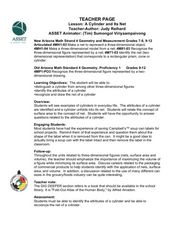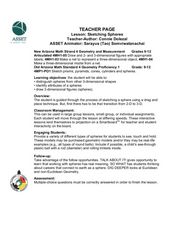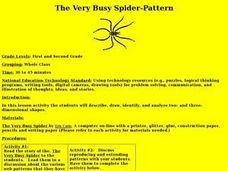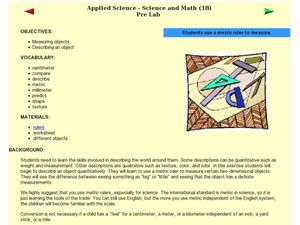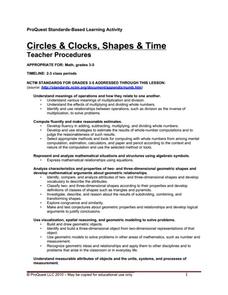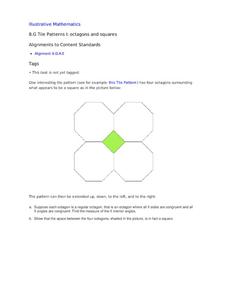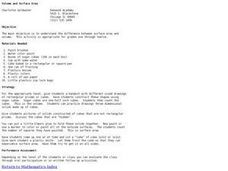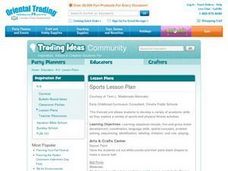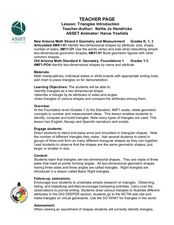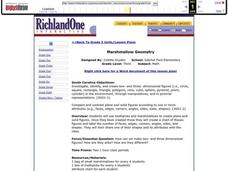Curated OER
A Cylinder and Its Net
Students sketch the nets for given polygons and cylinders. In this geometry instructional activity, students find the measurements that correspond with prisms, cones and cylinders. they identify parts of three-dimensional shapes.
Curated OER
Pyramids on Parade/Nets
Students sketch the shape of three dimensional pyramids using nets. In this geometry lesson, students differentiate a pyramid from other three dimensional shape. They define the attributes of pyramids.
Curated OER
Sketching Spheres
Students investigate spheres through sketches. In this geometry lesson, students sketch two and three dimensional shapes creating nets. They find and differentiate between the nets for prisms, pyramids, cones, cylinders and spheres.
Curated OER
A Sphere and Its Net
Students identify and sketch the nets for sphere. In this geometry instructional activity, students differentiate between two and three dimensional shapes. They find the surface area of each sphere.
Curated OER
Sketching Cylinders
Young scholars create nets of cylinders. In this geometry lesson, students calculate the surface area of cylinders and other solids. They show their understanding of three-dimensional shapes by solving problems.
Curated OER
Sketching Prisms
Students sketch and create nets of different polygons.In this geometry lesson, students differentiate prisms from other three-dimensional shapes. They define the properties of prisms.
Curated OER
Bubbles Everywhere!
Eighth graders use concrete and graphic models to derive formulas for finding perimeter, area, surface area, circumference, and volume of two- and three-dimensional shapes. This lesson is a fun way to practice measurement and circle and...
Curated OER
The Very Busy Spider-Pattern
Students explore two- and three-dimensional shapes. In this very busy spider instructional activity, students read the story and then create a spider web pattern of their own. The webs must use a symmetrical pattern....
Curated OER
Using a Metric Ruler
Students explore measuring with metric rulers. In this math instructional activity, students measure two-dimensional objects using metric units.
Curated OER
Circles and Clocks, Shapes and Time
Students work in groups to research clocks and practice telling time. In this telling time lesson, students use the computer program ProQuest to study circles, including radius and diameter, and practice drawing circles using a compass....
Curated OER
They're Everywhere! They're Everywhere!
Students gain an appreciation of the polygons and polyhedrons around them that make their world one of order and strength. They build polygons and polyhedrons, and then construct airplanes out of polygons.
Curated OER
Tile Patterns I: Octagons and Squares
This can be used as a critical thinking exercise in congruence or as a teaching tool when first introducing the concept. Four octagons are arranged in such a way that a square is formed in the middle. With this information, geometry...
Curated OER
Formulas for Volume and Surface Area
Students calculate the volume and surface area of each shape. In this geometry instructional activity, students use nets and other three dimensional polygons to create visuals of the volume of a shape. They define important...
Curated OER
3-D Figures Part 1
Elementary schoolers explore 3-D shapes. They transition from thinking of shapes as only 2-D. Pupils read Cinderella as a launching activity for their upcoming adventure, and explore a new world of 3-D shapes in this introductory lesson.
Curated OER
Paper Folding to Make Cubes
Examine patterns of figures composed of six-squares and predict which of the twenty presented could be folded to make a cube. They then fold large-scale patterns of these figures to confirm their hunches.
Curated OER
Volume and Surface Area
Students explore volume and surface area. In this math lesson, students fill boxes with cubes to identify the volume of the boxes. Students discuss area.
Curated OER
Volume and Surface Area, A Sweet Activity
Geometry.... sweet! Using sugar cubes, learners build rectangular prisms of different sizes and shapes. They glue them together and assess volume. Then they color the outer sides to visualize and compute surface area. To make a visceral...
Curated OER
Principles of Flight: Flying Paper Airplanes
Students investigate ways to enhance an object's flying ability. In this model construction instructional activity, students construct two paper airplanes, one of which is twice as big as the first. Students compare and...
Curated OER
Countdown Challenge: Platonic Solids - Part I
Use a Platonic solids worksheet to record the number of faces, edges, and vertices of five polyhedra whose faces, edges, and vertices are all identical. For each figure, learners write a proof of Euler's formula (F+V=E+2). They create a...
Curated OER
Sports Lesson Plan
Have your class participate in a variety of sports and craft activities using this resource. With sports as the theme, learners work on art projects. Students create soccer ball prints, a three dimensional football, and a sports collage.
Curated OER
Triangles Introduction
Students explore geometry by drawing various shapes in class. In this triangle characteristics instructional activity, students identify the attributes that classify a shape as a triangle and practice using their bodies to create...
Curated OER
Marshmallow Geometry
Third graders create 2D and 3D shapes using marshmallows and toothpicks. In this geometry lesson plan, 3rd graders create their shapes and document the number of faces, edges, corners, angles, and sides. They share one shape and its...
Curated OER
Surface Area with Polydrons
Students explore measurements by analyzing geometric shapes. In this surface area lesson, students identify the terms volume, weight, perimeter and area in order to find the requested measurements of specific polygons. Students utilize...
Curated OER
Sort it Out
Students identify and sort a variety of two- and three-dimensional objects and compare and contrast their attributes. They identify shapes, locate shapes on the faces of solids, sort real objects and explain the sorting rule, and...
